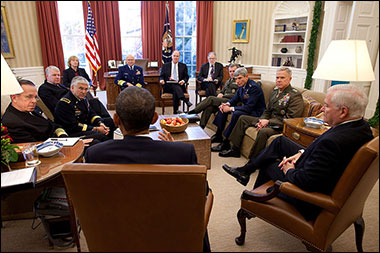Daniel McAdams
Ron Paul Institute
September 3, 2013
The first draft of the White House’s war authorization legislation was leaked today, signaling the opening round of the danse macabre, in which the bargaining and maneuvering over what Congress and the president both want — war on Syria — begins its public journey from conception to law.
As according to past practice, the first draft is considered “too broad” for some Members and Senators. Senator Patrick Leahy opened the bidding, emerging from a closed-door classified intelligence briefing (the kind where the doctored intercepts and phony satellite photos are spread out before Members to better help them make the “right” decision) stating that the first draft of the war authorization was “too open-ended,” but that he is certain it will be amended in the Senate.
Similarly, Republican Senator Pat Roberts felt the first draft was too open-ended but was given assurances that the White House would work with Congress to reach an acceptable version.
There will be fighting and sharp words along the way. Members will be coy and make impassioned speeches. It is all for show.
It is important to make this clear to readers: The fight is not between whether the House and Senate will pass or reject the president’s request for authorization to attack, but rather what kind of force authorization will ultimately be brought to the Floor for passage.
Republicans like the warmongering Cathy McMorris Rodgers of Washington and Scott Rigell of Virginia are torn between their concern over giving Obama too much war authorization — because a greatly broadened war could go badly and cause political blowback for them — and their concern that the president was not aiming high enough in his war aspirations. They are not to be satisfied with a short punishing volley of Tomahawks.
Some, like the authoritarian Chairman of the House Intelligence Committee Mike Rogers (R-MI) are furious that the president is wasting time consulting with and seeking authorization from Congress at all. The bombs should have long ago flown, believes Rogers. Why bother asking Congress for authorization?
The administration’s first draft looks a lot like the disastrously broad authorization passed after the attacks on 9/11 that Bush and then Obama have used for years to conduct global warfare. There is no reason to doubt that the draft as written would give the president all the authority he needs to attack Iran the minute the ink is dry. It has no sunset and is not restricted to the “shot across the bow” that Obama has stated he intends.
(Article continues on next page.)
The Emergency Election Sale is now live! Get 30% to 60% off our most popular products today!




